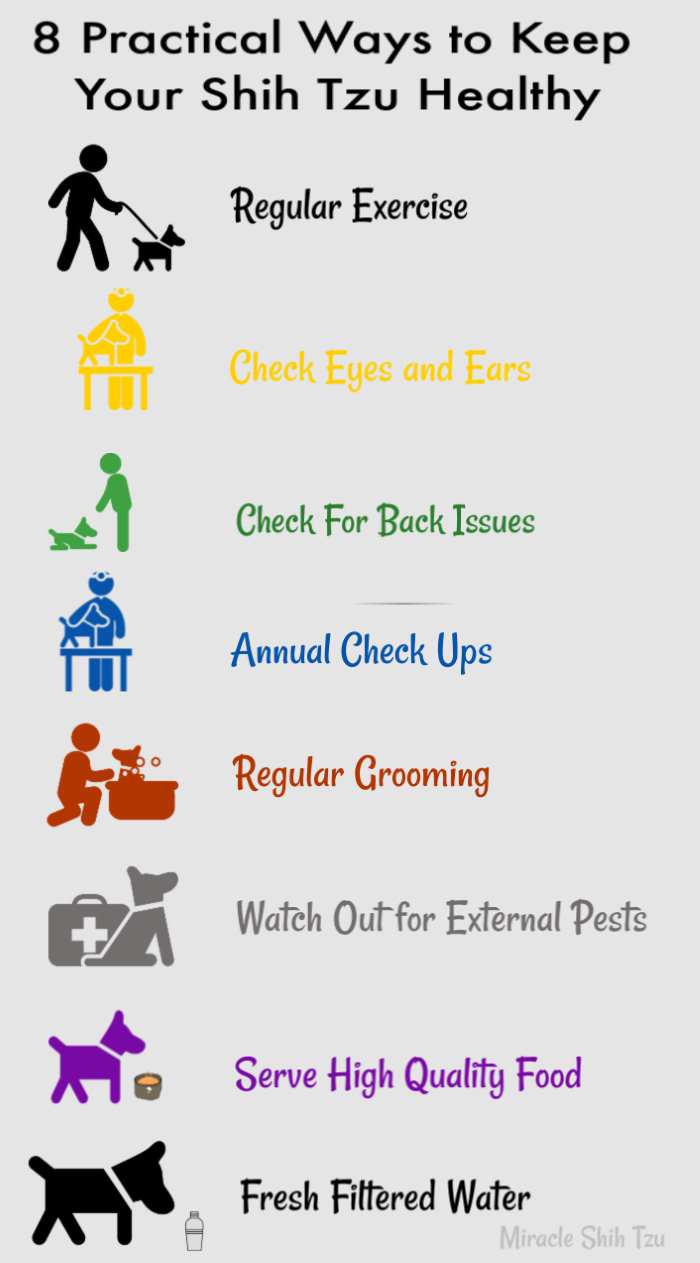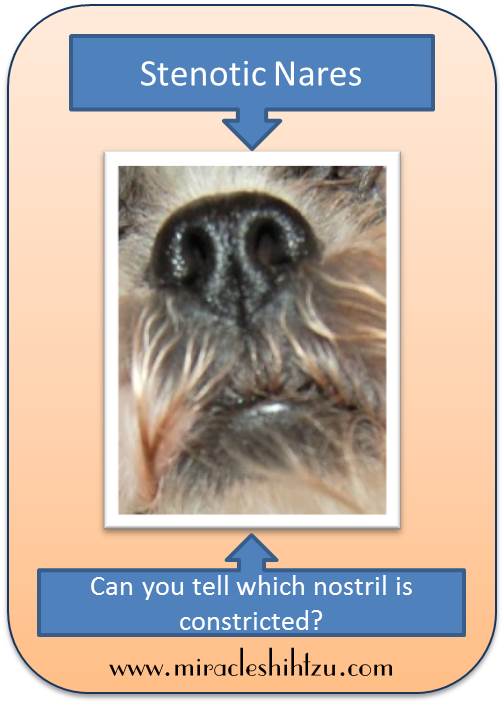Everything You Need to Know About Shih Tzu Eyes
About Shih Tzu Eyes by Janice Jones
Do you know everything you need to know about Shih Tzu Eyes? If not, you're not alone and in fact when I adopted my first Shih Tzu I didn't have a clue. But that was 40 years ago, and I've learned a thing or two about Shih Tzu eyes that I'd like to share with you.
Many people fall in love with the Shih Tzu because of their large, dark soulful eyes. A great deal of care will be needed over the course of his lifetime to keep those gorgeous eyes healthy. One of the most important things you can do for your Shih Tzu puppy is to make eye care a priority and part of your daily routine.
The Shih Tzu eyes are prone to infection, injury, and disease, but unless your puppy has inherited a known ocular disease, many problems can be avoided. Most Shih Tzu eye problems can be prevented through scrupulous attention. Unlike brushing and bathing, eye care is easy and quick, but should be done daily.
About Shih Tzu Eyes: First Learn to Observe
Before cleaning, take a quick look at your Shih Tzu’s eyes. A little extra light, such as a flashlight and perhaps a magnifying glass can help you determine if something just does not look right. Suspect your Shih Tzu puppy has a problem if they are:
- Pawing at their face
- Rubbing their face on the floor or other object
- Blinking repeatedly
- Squinting or not opening the eye completely
- Eyes closed
- Avoiding light
- Obvious mucous on or around the eyes
- Excessive tearing
- Hairs growing very near the eye or hairs touching the cornea
- Redness around the whites of the eyes
- Cloudy pupil
- A visible third eyelid
- A foreign object or blood coming from the eye: STOP Call your vet as this is an emergency
Most veterinary hospitals teach their staff to make all calls about pet eyes an emergency. If this is not the case with your veterinarian and you are unable to be seen immediately, call your nearest emergency veterinary hospital.
Shih Tzu are prone to a variety of different diseases and problems of the eyes. Shih Tzu Eye Problems can be anything from an infection to a disease that causes total blindness.
All Shih Tzu dogs have a little tearing, but when it becomes profuse, there may be a problem. If you suspect any problems, do not proceed to clean, but call your veterinarian for an appointment.
The most common problem you are likely to encounter is an infection. Eye infections result from
- Allergies
- Bacteria or Virus
- Debris or foreign objects getting into the eye (particles of grass, dirt, sand, seeds)
- An Injury
- An inherited condition of the eye or the eyelid
About Shih Tzu Eye Cleaning: How To
Daily Check List for Eye Care:
- Observe eyes for problems
- Remove Gunk under eyes
- Wash with warm water and washcloth or cotton ball
- Pat Dry
- Trim hairs near eyes (Optional)
A daily cleaning will help remove any gunk that accumulates. Cleaning below the eyes will also reduce the amount of tear stains that discolor the hair on light colored dogs.
Use a cotton ball, clean washcloth, or gauze square moistened with warm water. Wipe gently from the corner of the eye outward. Repeat as many times as needed to remove all debris, using clean surfaces each time. Blot dry.
You can also purchase a commercially prepared solution to use instead of water, or if you wear contacts, you will have a contact solution that also works well.
If the tears have hardened, you may need to use a fine toothed comb such as a flea comb to remove the debris. If you prefer, you either can use an ophthalmic solution over the counter or prescribed by your veterinarian to do your daily cleaning. A missed day is not an occasion to panic, especially if your puppy is otherwise healthy.
If tears have hardened and your Shih Tzu is bothered by a comb near his eyes, use your fingers to massage the area below the eyes and on either side of the nose. Most dogs don't mind this, and the massaging motion will break up the clumps of debris and make it easier to remove,
About Shih Tzu Eyes: Natural & Home-made Eye Soothers
Sea Salt Solution
For mildly irritated eyes, you can make your own solution that may help. To one cup of room temperature distilled water, add ¼ teaspoon of sea salt and mix thoroughly. Apply the solution using a cotton ball or by using a plastic dropper. Apply a few droppers of solution, then blot dry.
Tea Solutions
Another natural remedy is to use tea. You might also try cleaning your dog’s eyes with Chamomile or Eyebright tea. Brew the tea and allow cooling to room temperature. Apply about 2 or 3 drop into the eye 2 or 3 times per day until the infection clears.
Apply as you would the salt solution. If the eyes continue to be irritated after a few days, consult your veterinarian.
Protecting Shih Tzu Eyes
Do not let your puppy (or adult dog) hang his head out of a car window. Dust in the wind is likely to irritate his eyes.
Take care to prevent shampoo, conditioner, or other products from getting to your puppy’s eyes. There are over the counter eye ointments that you can purchase that will protect the eyes from any stray shampoo that gets near the eyes. Your vet may be able to recommend an ointment that you apply prior to bathing that will protect the eyes.
Unless you are allowing your Tzu’s coat to grow long, keep the hairs around the eyes clipped short. The hair on the head can either be clipped short or pulled up in a top know. The hair below the eyes and over the nose can be clipped short using a pair of blunt-nosed scissors.
Be very care when clipping so you do not accidentally pick up some skin. Most Shih Tzu has a deep skin fold near their eyes and you do not want to cut into the skin. Clippers are usually not used on a Shih Tzu dog unless you plan to shave the entire face.
If your puppy is very squirmy, sometimes grabbing a bit of the hair on the muscle (his mustache) while clipping the other side of his face will work. If not, wait until he is very tired before attempting to clip.
Prevent your dog from fighting with another dog. One quick bite to the face can permanently destroy an eye.
Avoid places where your dog could damage an eye such as running in the woods. Shih Tzu love the great outdoors, but train them to stay on the path.
Another dangerous area is a beach where blowing sand can irritate the eyes.
Any areas where high winds are common can create dangerous conditions for your Shih Tzu. Dust, debris, pollen, or any particles that are blowing can accidentally harm your Shih Tzu's eyes.
Shih Tzu Goggles
I know it might seem extreme, but having lost one dog to eye injuries to both eyes and another Shih Tzu who lost one eye, I can tell you that eye injuries are very real in this breed.
You can purchase dog googles if you are worried your Shih Tzu might injure their eyes, especially on a hike in the woods, on a sandy beach, or in windy situations while out and about on your daily walk
Do You Know About Shih Tzu Eye Colors?
- A Shih Tzu's Eyes can be dark brown, green or blue
- Brown eyes are the most common
- Green eyes are found in Liver Colored Shih Tzu
- Blue Eyes are rare, but not considered a health issue in the Shih Tzu Breed.
What Does the AKC Say About Shih Tzu Eyes?
According to the American Kennel Club breed standard, eyes should be round and large but not prominent. They should be placed well apart and looking straight ahead. They should be very dark but can be lighter on liver colored dogs or blue.
AKC considers it a fault in the show ring if they are small, close-set or light. Another fault is excessive eye white showing when the dog is looking straight at you.
Facts About Shih Tzu Eye Sight
A dog is born blind and deaf. Around 2 weeks of age, their eyes begin to open and within a day or so, their vision clears and they can see well.
- Compared to perfect human vision (20/20) dogs see about 20/75 to 20/80.
- The dog's retina contain cone cells that distinguish between blue, yellow and gray.
- Dog's lack the receptors for red and green just like people who are red/green colorblind.
- Dogs see very well in the dark due to their large pupils and abundance of rods in their retina.
- Anything a dog lacks in vision is made up for in his superior sense of smell and hearing.
Here is an article that might help you better understand all about your Shih Tzu Dog's Vision. Or perhaps you would like to understand how your dog seems to outsmart you when it comes to night vision.
"Hi, I'm Janice Jones, a former veterinary technician and Shih Tzu expert with over 40 years of experience with the breed. Through Miracle Shih Tzu, I combine my medical background and extensive breed knowledge to provide reliable, practical advice for Shih Tzu owners. My mission is to help you give your Shih Tzu the happiest, healthiest life possible through evidence-based information and real-world solutions. Whether you're new to the breed or a seasoned owner, you'll find trusted guidance here for all aspects of Shih Tzu care.
I hold an undergraduate degree in Psychology with a minor in biology, Early Childhood Education, and Nursing, and a Master's in Mental Health Counseling.











